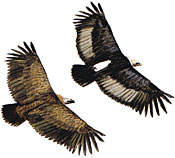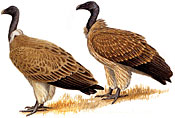|
|
| CLEAN PLATES: The restaurant at Pithauli before opening hours. |
In the last 15 years 95 percent of South Asia's vulture population has vanished. The fall in their population has been linked to an anti-inflammatory drug used by farmers to treat livestock. Residues of the drug in animal carcasses poisoned the vultures in large numbers.
From Pakistan to Bangladesh, the sight of vultures circling overhead or feasting on animal carcasses by river banks became rare. With the scavengers gone, disease spread and dogs proliferated.
But a ban on the veterinary drug, diclofenac, and the setting up of safe feeding centres for vultures has revived populations. (See: 'Soaring again', #286 and 'No more circling', #185). In Nepal, the district of Nawalparasi has seen a dramatic increase to vultures thanks to the opening of a feeding centre in Pithauli in 2006.
|
|
Many travellers on the East-West Highway have seen a large billboard here that says 'Jatayu Restaurant' and have mistaken it for a roadside diner and driven in for lunch. It is only later that they realise 'jatayu' means vulture and the restaurant is not for humans but for vultures.
Vultures dine for free at the Jatayu, and one of the 'waiters' is Yam Bahadur Nepali who lays out large chunks of buffalo for the vulture to feed on once a day. "If their population goes down it takes a long time to recover, so we have to make sure they can sustain themselves and their chicks," says Nepali. An adult pair of vultures hatches only one egg a year.
"Before the restaurant opened, there were only 17 vulture nests around here, now there are 32," reports Yuvaraj Mahato, member of the Vulture Management Committee.
Local agriculture specialist Sadananda Jaisi says the initiative is important, as the forests of Nawalparasi contain seven of the nine species of vulture in the world. Setting up the restaurant has also made it easier for conservationists to monitor the birds and their activities. Last year they fitted transmitters on two of the vultures, allowing them to monitor movement and habits.
The vulture resurgence has raised the area's profile as a tourist destination, and an observation post has been built so vulture visitors can watch the birds swoop down at mealtime. The restaurant management is also training 40 local youngsters to be bird-watching guides for vultures and other birds in the nearby Chitwan National Park.
The government recently opened a Vulture Fertilisation Centre at Kasara in Chitwan, Jaisi is trying to get it relocated to Pithauli. Another vulture restaurant is also being set up 20km to the north of here.
Says Nepali: "Vultures have a bad image, but we want to give the message that they are clean animals and they play a valuable role in preventing disease."







